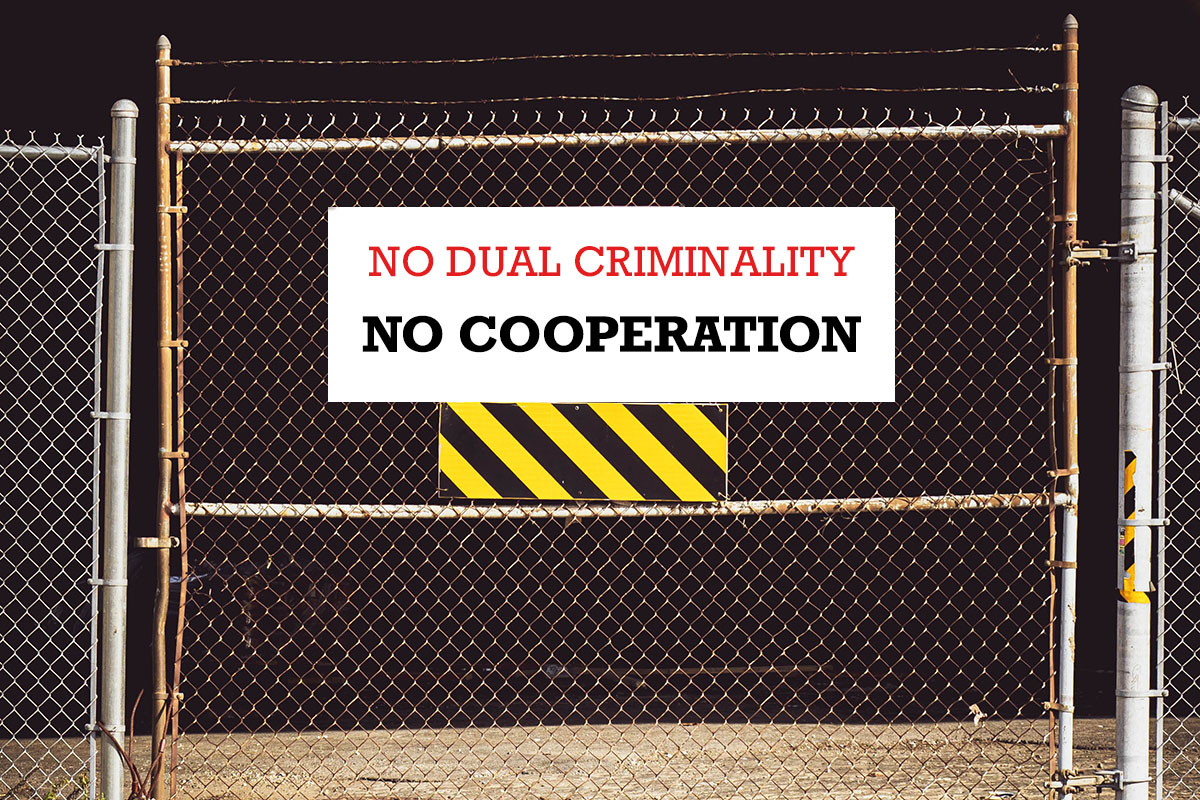International cooperation in illicit enrichment cases – scope for reform?

Why is international cooperation in asset recovery cases based on illicit enrichment/unexplained wealth laws a particularly challenging issue? This is a question we have received from many corners of the world following our publication last year of an open-access book on Illicit Enrichment: A Guide to Laws Targeting Unexplained Wealth.
In this annexed contribution to the book, Jonathan Spicer explains why international cooperation in illicit enrichment cases can come up against barriers – and asks whether there is scope for reform.
Jonathan is Senior Asset Recovery Specialist at the Basel Institute’s International Centre for Asset Recovery. He worked closely with the book’s author, Andrew Dornbierer, during the book’s development and editing.
Illicit Enrichment is freely available to read and download at illicitenrichment.org. A Spanish version of the book is available here: Enriquecimiento ilícito: Una guía sobre las leyes que abordan los activos de procedencia inexplicable.
Why international cooperation is needed
Criminal activity is not confined to national borders and illicit enrichment investigations will often have an international element. Investigators may seek information or evidence from other jurisdictions which relates to the suspected criminal activity that has led to the illicit enrichment or that relates to the possession, concealment or use of illicit assets.
For example, a public official may be suspected of using a foreign corporate structure to hold illicit funds in bank accounts in another jurisdiction. In order to progress the investigation (and potentially freeze the funds), prosecutors will need to use mutual legal assistance (MLA) to obtain evidence from the respective jurisdictions where the foreign company is registered and where the bank account is located.
Alternatively, it may be known that the child of a public official attends a renowned (and expensive) fee-paying school overseas. Investigators would be seeking information not only on the amount of fees that have been paid, but also on the source and manner of the payments. The school may voluntarily provide the information on the payment of the fees, but if it does not a court order will be necessary.
Accordingly, insofar as this information is not publicly available, assistance will be required from the authorities in the jurisdictions where intelligence or evidence is held. Whether that jurisdiction is able to assist will usually depend upon its domestic law and also whether it has either illicit enrichment as an offence or civil procedure.
Formal and informal cooperation channels
International cooperation exists at both informal and formal levels.
Informal international cooperation is usually seen as cooperation at a law enforcement level or as police-to-police assistance. Often this will amount to intelligence sharing (for example between financial intelligence units) or it may involve assistance which can be provided without the need for coercive measures (such as obtaining the voluntary assistance of the school in the example above).
As these enquiries may be made at an early stage where the investigation is not limited to illicit enrichment but also looking at underlying criminality, there are likely to be fewer difficulties in obtaining assistance.
Formal means of international cooperation, known as MLA, is where a state requests another state to apply its laws to obtain evidence for use in the proceedings being brought by the requesting state. This cooperation usually requires the use of coercive measures by the requested state, for example searches of properties, interviewing of witnesses or production of documents.
This formal means of cooperation is usually based on multilateral treaties, bilateral treaties or other forms of state to state agreements. In terms of illicit enrichment proceedings, MLA may be required to obtain evidence during the investigation stage, for example bank statements, or may be required to freeze assets or to enforce a final order for confiscation.
Dual criminality – an obstacle to international cooperation
Under the dual criminality principle, States will only provide MLA in criminal matters if the offence being investigated in the requesting State is also an offence in the State being asked to provide assistance.
The application of this principle by States which do not recognise an offence of illicit enrichment can often be an obstacle to international cooperation in illicit enrichment investigations.
The promotion of the criminalisation of illicit enrichment as a measure to tackle corruption is seen within UNCAC (Article 20) as well as other regional treaties such as IACAC (Article IX) or AUCPCC (Article 8).
However the introduction of illicit enrichment offences is not compulsory under these conventions.
Under UNCAC and the AUCPCC, non-mandatory language permits States to decide themselves whether to implement illicit enrichment laws, while under the IACAC, States may also refrain from introducing an illicit enrichment offence if they deem that it will contravene existing constitutional rights.
Providing assistance despite a lack of dual criminality
While the IACAC and AUCPCC do not address the issue of dual criminality directly, they both have almost identical provisions on assistance to be provided in illicit enrichment investigations, by States Parties that do not introduce illicit enrichment offences.
Under IACAC at Article IX paragraph 3:
Any State Party that has not established illicit enrichment as an offense shall, insofar as its laws permit, provide assistance and cooperation with respect to this offense as provided in this Convention.
The United States of America posted a reservation on its signing of the IACAC, where it stated that it understood it was not obligated to introduce an offence of illicit enrichment, as this would be inconsistent with the United States constitution and fundamental legal principles due to the burden of proof being placed on the defendant. However, the U.S. does make clear that as far as it is permitted by domestic law, it does intend to assist and cooperate with other States Parties investigating illicit enrichment.
The provisions of UNCAC emphasise the need for cooperation and address dual criminality directly. Article 43(1) mandates State Parties to cooperate in criminal matters in accordance with Article 44 to 50 of the Convention, before addressing dual criminality in Article 43(2):
In matters of international cooperation, whenever dual criminality is considered a requirement, it shall be deemed fulfilled irrespective of whether the laws of the requested State Party place the offence within the same category of offence or denominate the offence by the same terminology as the requesting State Party, if the conduct underlying the offence for which assistance is sought is a criminal offence under the laws of both States Parties.
Thus, States Parties receiving MLA requests cannot refuse on the basis of the name of the offence or the category under which it is deemed to fall, but must look at the actual conduct which constitutes the offence and consider whether this would amount to an offence under the domestic law.
However, illicit enrichment offences, and particularly those that include a shifting of the burden of proof on to the defendant, do not compare easily with other types of offending. Nonetheless, Article 46, which addresses MLA, requires State Parties to “afford one another the widest measure of mutual legal assistance in investigations, prosecutions and judicial proceedings in relation to the offences covered by [the] Convention”.
Finally, Article 46 (9) of UNCAC makes further provision on MLA and dual criminality:
(a) A requested State Party, in responding to a request for assistance pursuant to this article in the absence of dual criminality, shall take into account the purposes of this Convention, as set forth in article 1;
(b) States Parties may decline to render assistance pursuant to this article on the ground of absence of dual criminality. However, a requested State Party shall, where consistent with the basic concepts of its legal system, render assistance that does not involve coercive action. Such assistance may be refused when requests involve matters of a de minimis nature or matters for which the cooperation or assistance sought is available under other provisions of this Convention;
(c) Each State Party may consider adopting such measures as may be necessary to enable it to provide a wider scope of assistance pursuant to this article in the absence of dual criminality.
It can be said, therefore, that the framers of the Convention sought to encourage the provision of assistance by States Parties which had not criminalised offences under the Convention (including illicit enrichment) to those States Parties which have.
Requested States need to consider the purposes of the Convention under Article 1 and to consider whether it is possible to provide assistance falling short of coercive measures under their domestic law.
Pragmatic solutions to practical challenges
Despite these provisions, the lack of dual criminality may still prevent jurisdictions from using coercive measures to provide assistance in illicit enrichment investigations / prosecutions.
Where this is the case, requesting States may be able to obtain help by outlining the suspected criminal behaviour which is thought to have led to the illicit enrichment. When this behaviour is considered by the requested State, it may consider that it is possible to provide support in the obtaining of evidence using coercive measures.
In this respect, requesting States should consider providing a wide explanation of the facts revealed by the investigation and the activities of the suspects, as this will potentially provide grounds for the requested State to assist.
Caveat: the specialty principle
There is a caveat that should be highlighted here, which is the rule of specialty. This is that the evidence which is obtained by the requested State should only be used for the investigation or proceedings stated in the request.
Therefore, it would not be permitted to apply for evidence on the basis of a corruption investigation and then use it in a hitherto unmentioned prosecution for illicit enrichment. Permission has to be sought from the State which provided the evidence.
Scope for reform?
One of the reasons for the adoption by States of a criminal offence of illicit enrichment is due to the difficulties in investigating the underlying criminality, especially in cases of corruption. However, an offence of illicit enrichment has not been widely adopted in those States where the assets may be held or through which they have been laundered.
Notwithstanding this, many of those States encourage the adoption of procedures which tackle corruption and may have some alternative form of addressing illicit wealth, for example non-conviction based forfeiture procedures (incorporating unexplained wealth investigative orders such as the United Kingdom).
This does not seem to be enough to overcome the issue of dual criminality for some jurisdictions. The question arises whether further steps should be taken internationally to promote a limited exception to the rule on dual criminality, which would apply to MLA requests to obtain evidence in illicit enrichment cases.



